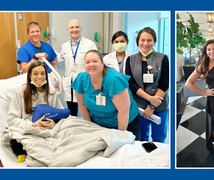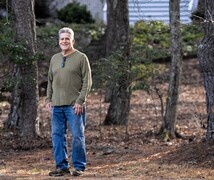When Michael Bentley of Raleigh felt lightheadedness, he listened to his wife and headed to Duke Urgent Care. Doctors there immediately recognized that Bentley needed emergency surgery and had him taken by ambulance to Duke where he underwent surgery to repair a ruptured aneurysm. Bentley knows the doctor's quick thinking and timely surgery are the reasons he's alive today. "If you’re going to be sick, Duke is the place to be,” he said.
Occasionally, the stars align in your favor. For Michael Bentley of Raleigh, that meant having the right doctors in the right place at the right time.
The 73-year-old real estate economist and motivational speaker was out on a routine Sunday errand when he began to feel lightheaded. At his wife’s urging, he went to Duke Urgent Care. “I was reluctant to go, but Valerie, with her female intuition and caring ways, insisted,” said Bentley. “Soon after I arrived, the doctor there said, ‘you don’t need me, you need Duke Hospital,’ and he immediately called for an ambulance.”
Once at Duke University Hospital, emergency department physicians ordered a CAT scan, which confirmed Bentley had a ruptured iliac aneurysm. “Aneurysms of the iliac artery are unusual,” said Duke vascular surgeon Leila Mureebe, MD. “Like all ruptured abdominal aneurysms, they cause a huge amount of blood loss in a short amount of time.”
The radiologist performing the CAT scan recognized the urgency of the situation. By the time Bentley was finished with the scan, an operating room was prepped and ready for his surgery. “Timing was everything. Every minute we wait lowers his chance of survival,” said Mureebe.
To repair the artery, Mureebe performed a minimally invasive endovascular procedure that successfully restored blood flow. “From the point of diagnosis, everything worked exactly the way we would like,” said Mureebe. “There was no delay in getting the patient the care he needed.”
His positive outcome earned Bentley a new nickname. “The doctors and staff started calling me ‘Miracle Man,’” he said.
This, according to Mureebe, is because few patients have an outcome as good as Bentley’s. “The number of patients who survive an aneurysm rupture and get back to normal life is around three percent,” she said.
According to Bentley, good fortune was only part of the equation. “I came in with decent cards in my hand. I was in good shape,” he said. “I had a quick diagnosis, I got to the hospital in time, the ‘plumbers’ were available to fix me up, and post-op care was first class. If you’re going to be sick, Duke is the place to be.”





